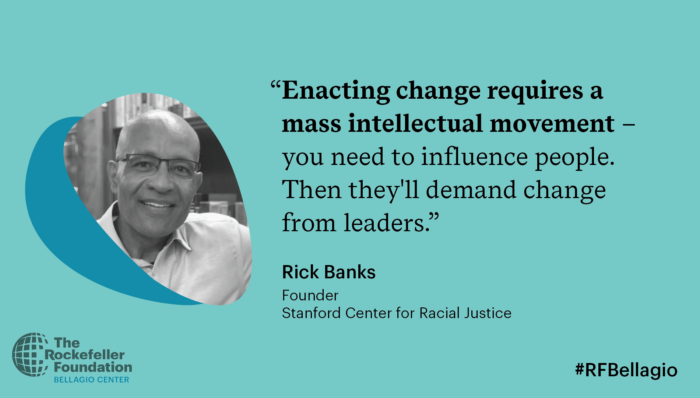Editor’s note: Ralph Richard Banks, known to many as Rick, has an abiding interest in race and inequality developed as a child growing up in Cleveland, Ohio, the son of refugees from the Jim Crow south. Education changed the trajectory of his life. He went from an inner-city elementary school to an elite all-boys suburban private school. That transition exposed him to the divides of race and class that shaped his city, and the nation, then and now.
Banks received his Bachelor’s and Master’s degrees from Stanford University, where he is now the Jackson Eli Reynolds Professor of Law, and the Founding Faculty Director of the Stanford Center for Racial Justice, which aims to connect faculty and students at Stanford to racial problems in American society.
After graduating from Harvard Law School and practicing law, Banks entered academia. He is the author of the trade book Is Marriage for White People? How the African American Marriage Decline Affects Everyone, and of the law casebooks Racial Justice and the Law, as well as Family Law in a Changing America.
During his October 2022 Bellagio Center residency, he worked on a book about college and the American dream. The book examines how and why our nation’s leading universities have become luxury goods constructed around ideas of scarcity and exclusivity, and how this reinforces racism while undermining the development even of those students who are its ostensible beneficiaries.
How is your work helping to build a more racially and economically just society?
The big goal is to try to democratize opportunities to learn and grow, and to become productive economically. The paradox at the heart of my book is that we rely on higher education as the primary means of fulfilling “the American dream.” In fact, college has become an impediment to the American dream.
Higher education functions as both a necessity and a luxury when it should be neither. The elite schools to which students clamor to be admitted are like luxury goods: scarce, exclusive, expensive. Other colleges function more like necessities to enter the economic mainstream. We should think of education, including college, as a common good that all people can access to improve themselves and expand their viewpoints.
What keeps you up at night about achieving your goals?
What keeps me up at night is that I’ll write a book that is read only by lawyers or law professors, or even policymakers, and doesn’t speak to a broader population. The big goal, one so bold I am almost hesitant to voice it, is to write something that becomes part of the American cultural conversation. A book that influences how people think about their life, and the institutions that shape it and prompts them to take action.
If you want change, you can’t just talk to the leaders of the system. You need to influence people more generally, and then they’ll demand changes from the leaders. You need to create a mass intellectual movement. It’s not because a person with “power” decides to do something differently. It’s because of the people who they’re accountable to , and the people they are accountable to, and on down.
What makes you optimistic?
As a society, we have made the moment of college application and admission into a life changing event, so that one’s future depends mightily on what happens when they are 17 or 18 years old. That’s not the way society should be structured.
I think more people are seeing that and feeling that there’s something wrong with having such great stakes turn on decisions and events that happen so early in people’s lives. This system is not working for most people.

What breakthroughs do you envision needing to happen by 2050 for us to arrive at the racially and economically just society that you envision?
It’s a great idea to have people at the Bellagio Center from across different disciplines with different perspectives because for me, the goal is not only to talk to people within a narrow discipline but to reach a broader audience.
One challenge is that as a society, we want people to compete, and the winners get the spoils. “Well, you had your chance, and you blew it, so you deserve what you get.” We’ve imported that into education as well. The positive side of that is individual opportunity – we want people to strive and change their lives. But the dark side is that we have a system set up to produce lots of people who feel like losers, while a small group of people become winners. All for decisions made while they were teenagers.
We need to think of our society and our educational system, and our economic system frankly, more as something that’s built on cooperation and teamwork rather than competition. The “winner take all” educational system we’ve created leaves us all worse off, I will argue in the book.
Learn More: Discover Ralph Richard Banks’ other work, and follow the Center for Racial Justice on Instagram.